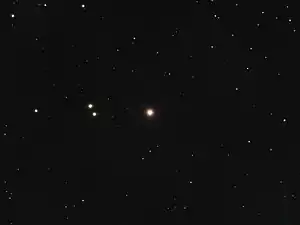6 Boötis
6 Boötis is a binary star[4] system in the northern constellation of Boötes,[8] located around 460 light years away from the Sun.[1] It has the Bayer designation e Boötis; 6 Boötis is the Flamsteed designation.[8] The system is visible to the naked eye as a faint, orange-hued star with an apparent visual magnitude of 4.92.[2] It is moving closer to the Earth with a heliocentric radial velocity of −3 km/s.[2]
 6 Boötis in optical light. | |
| Observation data Epoch J2000.0 Equinox J2000.0 | |
|---|---|
| Constellation | Boötes |
| Right ascension | 13h 49m 42.82223s[1] |
| Declination | +21° 15′ 50.8580″[1] |
| Apparent magnitude (V) | 4.92[2] |
| Characteristics | |
| Spectral type | K4 III[3] + M8 V[4] |
| B−V color index | 1.432±0.013[2] |
| Astrometry | |
| Radial velocity (Rv) | −3.71±0.48[1] km/s |
| Proper motion (μ) | RA: +33.773[1] mas/yr Dec.: +10.842[1] mas/yr |
| Parallax (π) | 7.1527 ± 0.3659[1] mas |
| Distance | 460 ± 20 ly (140 ± 7 pc) |
| Absolute magnitude (MV) | −0.49[2] |
| Orbit[4] | |
| Period (P) | 944±8 d |
| Eccentricity (e) | 0.41±0.09 |
| Periastron epoch (T) | 2,444,739.5±31.0 JD |
| Argument of periastron (ω) (secondary) | 359±15° |
| Semi-amplitude (K1) (primary) | 1.19±0.15 km/s |
| Details | |
| Radius | 38[5] R☉ |
| Luminosity | 430.124[1] L☉ |
| Surface gravity (log g) | 1.910[6] cgs |
| Temperature | 4,050[6] K |
| Metallicity [Fe/H] | −0.24[6] dex |
| Rotational velocity (v sin i) | 2.0[7] km/s |
| Other designations | |
| Database references | |
| SIMBAD | data |
This is a single-lined spectroscopic binary system with an orbital period of 2.58 years and an eccentricity of 0.4.[4] The visible component is an evolved giant star with a stellar classification of K4 III.[3] Its measured angular diameter is 2.53±0.12 mas.[9] At the estimated distance of the star, this yields a physical size of about 38 times the radius of the Sun.[5] The star is radiating 430[1] times the luminosity of the Sun from its enlarged photosphere at an effective temperature of 4,050 K.[6] Its companion is probably a low mass red dwarf of around class M8 V.[4]
References
- Brown, A. G. A.; et al. (Gaia collaboration) (August 2018). "Gaia Data Release 2: Summary of the contents and survey properties". Astronomy & Astrophysics. 616. A1. arXiv:1804.09365. Bibcode:2018A&A...616A...1G. doi:10.1051/0004-6361/201833051. Gaia DR2 record for this source at VizieR.
- Anderson, E.; Francis, Ch. (2012), "XHIP: An extended hipparcos compilation", Astronomy Letters, 38 (5): 331, arXiv:1108.4971, Bibcode:2012AstL...38..331A, doi:10.1134/S1063773712050015, S2CID 119257644.
- Yoss, K. M.; Griffin, R. F. (September 1997), "Radial Velocities and DDO, BV Photometry of Henry Draper G5-M Stars Near the North Galactic Pole", Journal of Astrophysics and Astronomy, 18 (2–3): 161, Bibcode:1997JApA...18..161Y, doi:10.1007/BF02714877, S2CID 123221180.
- Griffin, R. F. (June 1985), "Spectroscopic binaries near the North Galactic Pole. Paper 12 : 6 Bootis.", Journal of Astrophysics and Astronomy, 6: 77–83, Bibcode:1985JApA....6...77G, doi:10.1007/BF02715079, S2CID 124682374.
- Lang, Kenneth R. (2006), Astrophysical formulae, Astronomy and astrophysics library, 1 (3rd ed.), Birkhäuser, ISBN 3-540-29692-1. The radius (R*) is given by:
- McWilliam, Andrew (December 1990), "High-resolution spectroscopic survey of 671 GK giants. I - Stellar atmosphere parameters and abundances", Astrophysical Journal Supplement Series, 74: 1075–1128, Bibcode:1990ApJS...74.1075M, doi:10.1086/191527
- De Medeiros, J. R.; et al. (October 2002), "The Rotation of Binary Systems with Evolved Components", The Astrophysical Journal, 578 (2): 943–950, arXiv:astro-ph/0207288, Bibcode:2002ApJ...578..943D, doi:10.1086/342613, S2CID 16196039.
- "6 Boo". SIMBAD. Centre de données astronomiques de Strasbourg. Retrieved 2019-04-23.
- Richichi, A.; et al. (February 2005), "CHARM2: An updated Catalog of High Angular Resolution Measurements", Astronomy and Astrophysics, 431 (2): 773–777, Bibcode:2005A&A...431..773R, doi:10.1051/0004-6361:20042039.